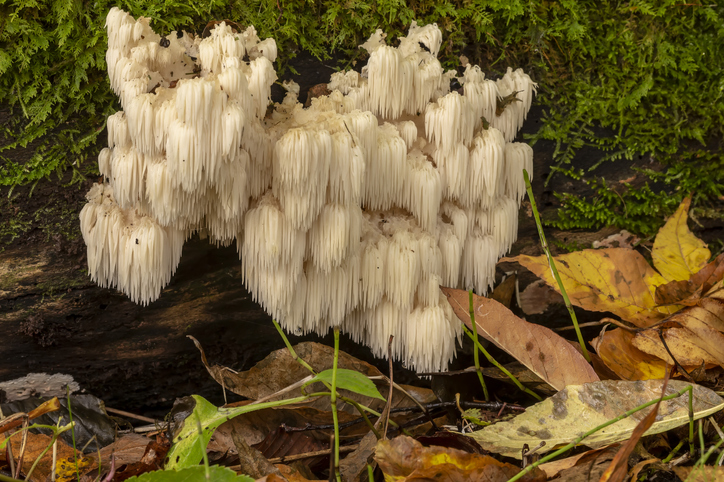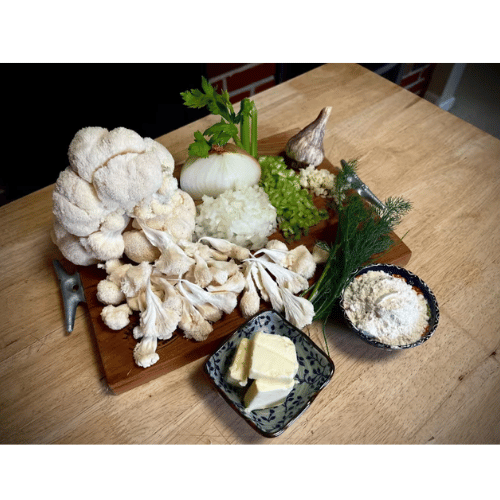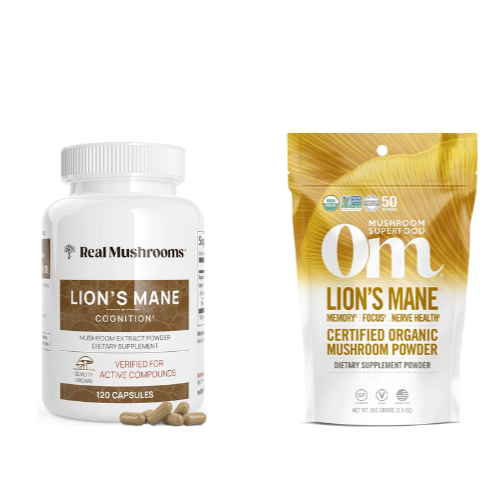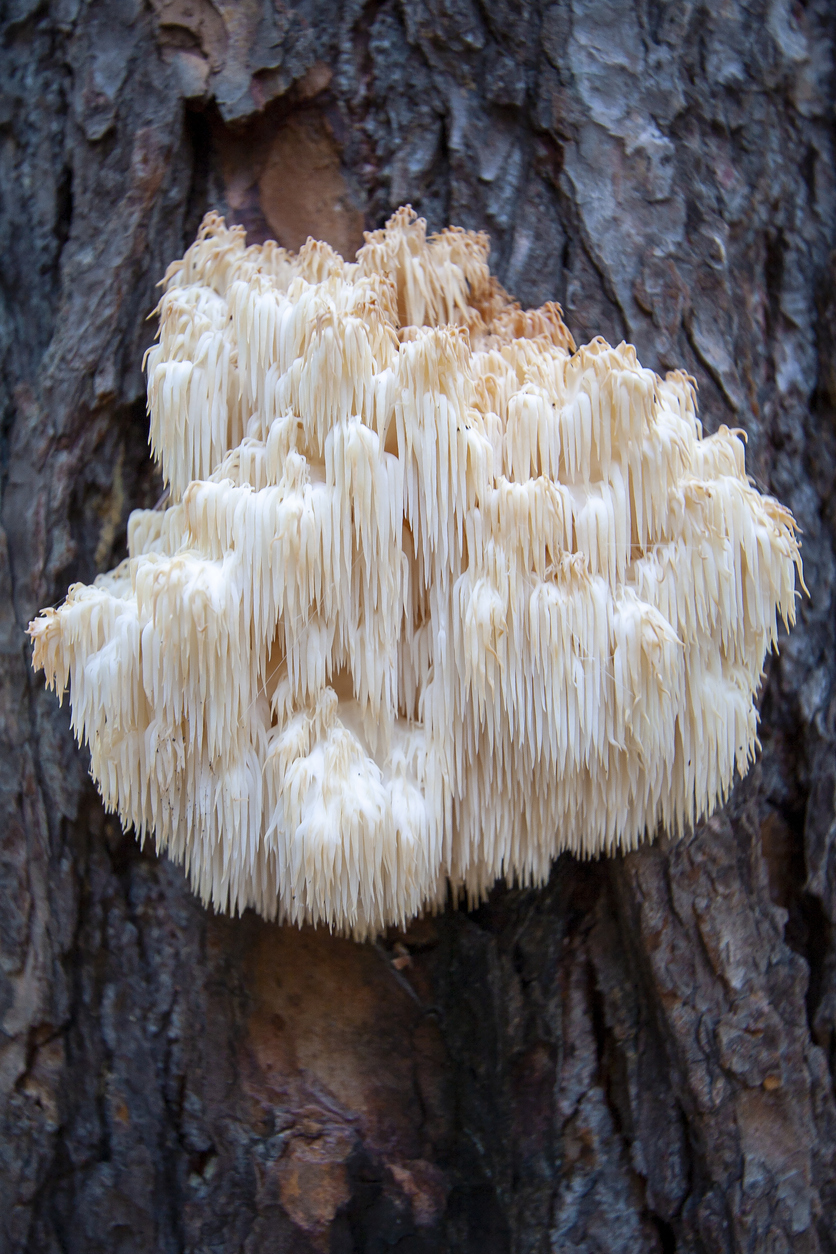In the realm of natural supplements, few have sparked as much intrigue and debate as the Lion's Mane mushroom. This enigmatic edible fungus, Hericium erinaceus, has carved a niche in the annals of Traditional Chinese Medicine and is now making waves in Western wellness circles. With its striking, shaggy appearance that mirrors the majestic mane of a lion, this mushroom is more than just a culinary delight. It symbolizes nature's untapped potential in influencing human health, particularly brain health.
But what makes Lion's Mane mushroom, a staple in Asian countries for centuries, suddenly capture the spotlight in the world of modern medicine and dietary supplements? Is it truly the panacea for cognitive function, nerve health, and a spectrum of other health benefits as touted by its proponents? Or is this just another passing trend in the ever-evolving landscape of natural supplements? Many are asking: is Lion's Mane worth it?
Also, amidst the buzz and scientific scrutiny, it is critical to approach Lion's Mane mushroom with a discerning eye. Not all supplements are created equal, and the importance of only high-quality sources cannot be overstated. As we embark on this exploration, remember that consulting with a healthcare provider before integrating Lion's Mane into your supplement regimen is imperative, especially for those with specific health conditions or taking medications.
Key Takeaways:
- Lion's Mane has been linked to numerous health benefits, including cognitive function improvement and nerve health support.
- Scientific research, though still in the early stages, supports the potential health benefits of Lion's Mane for brain health and immune system support.
- As with any supplement, it's essential to consult with a healthcare provider before adding Lion's Mane to your regimen, especially for those with mushroom allergies or taking certain medications.
So, is Lion's Mane worth it? Let's dive into the fascinating world of this medicinal mushroom and uncover the truth behind its purported health benefits.
What Is Lion's Mane Mushroom?
Lion's Mane, scientifically known as Hericium erinaceus, is a medicinal mushroom that grows on hardwood trees. Known for its distinctive shaggy appearance resembling a lion's mane, this mushroom has been used for centuries in Asian countries for culinary and medicinal purposes. In recent years, Lion's Mane has become popular in the West as a natural supplement, available in various forms such as lion's mane extract, lion's mane mushroom powder, and fresh lion's mane mushrooms.
The Science Behind Lion's Mane
In the scientific community, the Lion's Mane mushroom is increasingly recognized for its potential health benefits, particularly in the realms of brain health and nerve repair. Pivotal to its therapeutic potential is its role in stimulating nerve growth factor (NGF), a vital protein for neurons' development, maintenance, and survival. This unique quality of Lion's Mane has sparked significant interest in its application for aiding brain injury recovery and managing conditions like mild cognitive impairment. Research, encompassing both human and animal studies, is progressively shedding light on how various forms of Lion's Mane supplements, including extracts and powders, could potentially enhance cognitive functions and test scores. This research addresses broader health concerns, such as its effects on gut health and heart disease, and understanding possible contraindications, including mushroom allergies and interactions with nonsteroidal anti-inflammatory drugs. This article seeks to provide a balanced and informative overview of Lion's Mane, making it a valuable resource for people dealing with conditions like diabetic nerve pain or cognitive impairments and anyone interested in exploring the diverse health implications of this fascinating medicinal mushroom.
Cognitive Function and Brain Health
Lion's Mane mushroom is increasingly recognized in the scientific community for its promising role in enhancing brain health and cognitive function. Backed by clinical research and peer-reviewed studies featured in respected publications like Phytotherapy Research and Biomedical Research, this unique mushroom is more than just a culinary ingredient; it's emerging as a significant player in restorative medicine. Studies have shown that consuming Lion's Mane supplements correlates with improved cognitive test scores in older adults, suggesting its potential to combat cognitive decline. This ongoing research delves into the intricate ways Lion's Mane may contribute to brain health, from aiding in brain injury recovery and nerve growth to managing mild cognitive impairments. As we explore the multifaceted benefits of Lion's Mane, it becomes apparent that this isn't just an ordinary edible mushroom but a pivotal component in exploring natural cognitive enhancement and brain health strategies.
Nerve Health and Recovery
Lion's Mane mushroom has shown remarkable potential in the field of restorative medicine, particularly in its ability to foster the regeneration of damaged nerve cells. Research published in the International Journal of Medicinal Mushrooms highlights how extracts derived from the fruiting body of Lions Mane can actively stimulate nerve tissue repair. This groundbreaking discovery holds significant promise for treating conditions like diabetic nerve pain and enhancing overall nerve health. The implications of these studies suggest that Lion's Mane could be a key natural solution in nerve recovery and health maintenance, marking a significant step forward in medical science's understanding and application of medicinal mushrooms.
Immune System Support
The immune system benefits from the intake of Lion's Mane as well. Research published in the Journal of Agricultural and Food Chemistry has demonstrated that Lion's Mane mushroom consumption daily can boost the immune response, potentially due to its anti-inflammatory effects and the presence of beta-glucans, known to modulate the immune system.
Heart Health and Blood Sugar Regulation
Lion's Mane may also contribute to heart health by helping to lower blood sugar levels and reduce the risk of blood clotting, which can lead to heart disease. The anti-inflammatory properties of Lion's Mane, as reported in Food Biochemistry and J Tradit Complement Med, could be a natural alternative to nonsteroidal anti-inflammatory drugs (NSAIDs) for some individuals.

Lion's Mane as an Alternative Medicine Powerhouse
Have you ever considered the role of lion's mane in alternative medicine? This edible mushroom is gaining traction as a natural supplement that rivals conventional treatments. In the realm of alternative medicine, lion's mane may offer a holistic approach to health and wellness. Peer-reviewed studies are beginning to shed light on its potential, suggesting that this fungus isn't just a culinary delight and a medicinal marvel. As people seek natural alternatives to pharmaceuticals, lion's mane stands out, especially given its anti-inflammatory properties. It could be a game-changer for those looking to reduce reliance on nonsteroidal anti-inflammatory drugs.
The benefits of lion's mane don't stop at inflammation. This mushroom is also being studied for its effects on overall health, including its ability to support brain cells. Human studies have shown promising results, indicating that taking lion's mane supplements daily could improve cognitive function. While more research is needed to understand its benefits fully, the current evidence suggests that lion's mane powder or supplements could be a valuable addition to one's health regimen. Only high-quality sources should be used, ensuring you get the most out of this natural powerhouse. Lion's Mane and Digestive Health The gastrointestinal tract is where Lion's Mane may flex its therapeutic muscles. Studies suggest that the anti-inflammatory properties of Lion's Mane can be a boon for those with sensitive stomachs or digestive issues. The mushroom is believed to reduce inflammation in the gut, which is often the root cause of discomfort and various digestive conditions. By incorporating Lion's Mane powder into your diet, you could support the integrity of your intestinal walls and foster a healthier gut environment.
Moreover, the benefits of Lion's Mane extend to potentially acting as a prebiotic, which stimulates the growth of good bacteria in the gut. This is crucial because a balanced microbiome is essential for optimal digestion, nutrient absorption, and overall health. Lion's Mane supplements, when taken regularly, could help maintain this balance, making it a valuable addition to a gut-friendly diet. Remember, only high-quality sources with pure extracts should be considered to maximize these health benefits.
Lion's Mane isn't just a one-trick pony; its repertoire includes significant antioxidant activity. Antioxidants are vital in combating oxidative stress, which is implicated in aging and numerous diseases. By taking Lion's Mane daily, you may be arming your cells with the tools they need to fight off the damage caused by free radicals. This could translate to better overall health and even a slower aging process.
Peer-reviewed studies have begun to delve into the full range of effects that Lions Mane mushrooms can offer, and the emerging research is indeed promising. Its natural compounds, such as hericenones and erinacines, are central to the mushroom's benefits, known for their potent antioxidant properties. Incorporating Lion's Mane into your diet, be it as a powder in your morning smoothie or as a supplement, could give your body a significant antioxidant boost. It's important, however, to source these supplements from high-quality providers to fully benefit from Lion's Mane's myriad potential health advantages.
Lion's Mane and Digestive Health
Daily Lion's Mane mushroom intake has been linked to many digestive health benefits. The mushroom contains compounds that may act as prebiotics, nourishing the beneficial bacteria in the gut. This symbiotic relationship can lead to improved digestion and a reduction in the symptoms of digestive discomfort. Studies suggest that the anti-inflammatory properties of lion's mane may also contribute to soothing an irritated digestive tract, making it a potential ally for those with conditions like gastritis or inflammatory bowel disease.
Moreover, lion's mane appears to have a protective effect on the stomach lining. Fostering the growth of good bacteria and inhibiting harmful ones may help prevent the development of ulcers. The mushroom's ability to promote the regeneration of stomach tissue further underscores its potential as a natural therapeutic agent for digestive health. As research continues, the effects of lion's mane on the digestive system are becoming more evident, positioning it as a valuable supplement for gut health.
Lion's Mane and Anxiety Reduction
Have you ever considered the effects of Lion's Mane on your mental well-being? Studies suggest that Lion's Mane may be a beacon of hope for those battling anxiety. The mushroom's natural compounds have been linked to the production of nerve growth factors, which could potentially soothe the nervous system and alleviate anxiety symptoms. This is particularly intriguing because it offers a natural alternative to traditional pharmaceuticals, which often have many side effects.
Moreover, incorporating Lion's Mane supplements into your daily routine could be a game-changer for mental health maintenance. Anecdotal evidence and some peer-reviewed studies hint at the mushroom's capacity to enhance mood and provide a calming effect. While more research is needed to determine the extent of these benefits conclusively, the current findings are promising. Lion's Mane appears to support a more balanced mental state, making it a worthy addition to the conversation on natural anxiety remedies.
Lion's Mane and Cognitive Enhancement
The quest for improved cognitive function has many turning to Lion's Mane mushrooms daily. According to emerging research, this fascinating fungus is a gourmet delicacy and a cognitive enhancer. Lion's Mane supplements are gaining popularity among those looking to sharpen their minds, with studies indicating potential improvements in focus, memory, and overall brain function. The health benefits of Lion's Mane extend to fostering neural plasticity, which is crucial for learning and memory.
Taking Lion's Mane powder or capsules could be likened to fertilizing your brain garden, encouraging the growth of new connections and strengthening existing ones. The mushroom's bioactive compounds are thought to stimulate the production of bio-proteins that are essential for brain health. As we continue to understand the full scope of Lion's Mane's cognitive benefits, it's becoming clear that this natural nootropic could be a valuable tool for those seeking to enhance their mental performance.
Lion's Mane and Antioxidant Activity
The health benefits of lion's mane extend to its antioxidant capabilities. Antioxidants are crucial in combating oxidative stress, which is implicated in aging and various diseases. Lion's mane mushroom may offer a rich source of these vital compounds, contributing to the body's defense against cellular damage. The presence of hericenones and erinacines, unique to lion's mane, enhances its antioxidant profile, which could be particularly beneficial in warding off chronic conditions and supporting overall wellness.
Therefore, taking lion's mane supplements could be a proactive measure to maintain cellular health and longevity. The mushroom's antioxidant effects are not only promising for preventing damage but also for repairing it. By neutralizing free radicals, lion's mane helps to maintain the integrity of cells and tissues, which is essential for the proper functioning of the body's systems. As more peer-reviewed studies emerge, the full scope of the antioxidant impact of lion's mane will become clearer, potentially solidifying its place in preventive health strategies.

Incorporating Lion's Mane for Optimal Health Benefits
Consistency is key in reaping the health benefits of lion's mane. Incorporating lion's mane mushrooms daily into your diet could potentially lead to significant improvements in various health aspects. Whether you consume it in powder form, as a supplement, or even as a part of your meals, it is important to maintain a regular intake. This ensures that your body receives a steady supply of the mushroom's beneficial compounds, which could contribute to better brain health, nerve recovery, and immune system support.
But how exactly can you make lion's mane a part of your daily routine? It's simpler than you might think. Lion's mane powder can be easily added to smoothies and teas or sprinkled on top of your favorite dishes. Lion's mane supplements are available in capsule form for those who prefer a more straightforward approach. Remember, the placebo group in studies often shows no improvement, so the positive effects of lion's mane are not just in your head. By including lion's mane in your diet, you're taking a proactive step towards enhancing your overall health, potentially regulating blood sugars, and reducing inflammation.
Gut Health and Anti-Inflammatory Effects
The digestive tract also seems to benefit from Lion's Mane. Its anti-inflammatory effects can support gut health, potentially alleviating symptoms of digestive disorders. Lion's Mane has been found to have antibacterial properties against H. pylori, a common gut pathogen, as per studies in Phytotherapy Research.
Mental Health and Mood
Emerging research suggests that Lion's Mane may positively impact mental health. In studies focused on major depressive disorder, Lion's Mane supplements have been associated with mood improvement and may act as a supportive treatment for sleep disorders and overall mental performance.
Considerations and Potential Side Effects
While Lion's Mane is generally considered safe, it's important to be aware of potential side effects and interactions. Those with a mushroom allergy should avoid Lion's Mane, as it may interact with certain medications, particularly those affecting blood clotting. Always consult with a healthcare provider before starting any new supplement regimen.

Quality and Sourcing
When considering Lion's Mane, choosing only high-quality sources is crucial. Supplements should be sourced from reputable companies that provide transparency about their production processes and the purity of their products. Fresh Lion's Mane mushrooms can often be found at grocery stores or specialty markets, and supplement form is widely available online. For more insights and a comprehensive review of what we believe to be the top five Lion's Mane supplements currently available on the market, be sure to read our article, “The Many Health Benefits Of Taking A Lion's Mane Supplement.”👇
The Verdict on Lion's Mane
So, is Lions Mane worth it? The current body of research, including Internal Medicine and Restorative Medicine studies, indicates that Lions Mane has a promising range of potential health benefits, particularly for cognitive function and nerve health. However, more research is needed to understand its effects and optimal dosages fully.
How to Incorporate Lion's Mane into Your Diet
Incorporating Lion's Mane into your diet can be done in various ways to suit your lifestyle and preferences. For those who enjoy culinary adventures, fresh Lion's Mane mushrooms can be a delightful addition to your meals, bringing flavor and health benefits. Suppose you prefer convenience or want to integrate this superfood subtly into your daily routine. In that case, Lion's Mane powders are versatile and can easily be blended into smoothies, teas, or other beverages. For a more straightforward approach, supplements in capsule form offer a simple yet effective way to include Lion's Mane in your diet. Regardless of the form you choose, it's crucial to adhere to the dosage recommendations provided by the manufacturer or your healthcare provider. To understand more about the specific benefits and potential side effects of powdered Lion's Mane, don't miss our detailed article, “Is Powdered Lions Mane Effective? Health Benefits and Side Effects Explored,” where we delve deep into its effectiveness.👇
In Conclusion - Is Lions Mane Worth It?
In conclusion, with its deep roots in traditional Chinese medicine, the Lion's Mane mushroom has become a significant player in modern health and wellness practices. The breadth of research supporting its myriad benefits — from enhancing cognitive function and nerve health to bolstering the immune system — underscores its potential as a valuable supplement. Based on the current scientific understanding, it's clear that incorporating Lion's Mane into one's health regimen can be a worthwhile endeavor for many. While it's generally considered safe, consultation with a healthcare provider is still advisable to ensure its suitability for individual health needs. For those seeking a natural boost to their mental and physical well-being, Lion's Mane mushroom stands out as a compelling, affirmative answer to the question of its worth in a holistic health approach.
FAQ Section
Q: Can Lion's Mane improve memory and concentration?
A: Yes, research suggests that Lion's Mane may improve cognitive function, including memory and concentration, particularly in older adults. However, individual results can vary, and more research is needed.
Q: Are there any side effects of taking Lion's Mane?
A: Lion's Mane is generally well-tolerated, but some may experience gastrointestinal discomfort or allergic reactions. It's important to consult a healthcare provider before starting Lion's Mane, especially for those with pre-existing conditions or taking other medications.
Q: How long does it take to notice the benefits of Lion's Mane?
A: The time frame for experiencing the benefits of Lion's Mane can vary depending on the individual and the condition being addressed. Some may notice improvements within a few weeks, while others may take several months of consistent use.
Thanks for taking this journey with us to explore the many benefits of Lions Mane Mushrooms. And, if you want to add to your library of knowledge, you should check out the other articles mentioned and linked above. It never hurts to add to your knowledge arsenal!
Also, please return soon to check out our next review of another incredible supplement – we’re always looking out for YOU!
*We are not qualified medical advisors. The content here is only based on our personal opinions and should NOT be used as a substitute for a healthcare professional's advice!











Member discussion